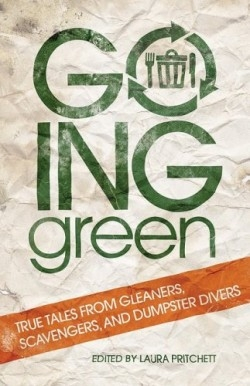Going Green
True Tales From Gleaners Scavengers and Dumpster Divers
By now many of us have learned the wisdom of reducing, reusing, and recycling. Few people, however, understand the beauty and usefulness of a true life of gleaning and sorting through the refuse left behind by others to find food, art, building materials, furniture, and treasures of all sorts and value.
The writers included in Going Green live lives made richer by the things they find in dumpsters, on the side of the road, thrown away at building sites, at estate sales, and anywhere else they happen to wander. Many of them, like Laura Paskus, are thrilled to discover food they can feed to their families or to the chickens out back. Theres no shame in this type of foraging, though Paskus admits, “When all our neighbors were without electricity and unable to leave their homes-I was too embarrassed to share the oranges and bags of lettuce we couldnt eat. And I definitely dont mention that the food our infant daughter is eating was almost trash, too.”
She reflects that her embarrassment is somewhat outrageous against the backdrop of American waste. Another writer, Tim Vaughan, agrees. In his work teaching English to immigrants, he comes face-to-face with the discrepancy between what some Americans throw away and what other people need, and it angers him. While he rummages through dumpsters in search of second-hand clothing, building materials, kitchen items, and anything else that might make life easier for his students and for himself, he also recycles the tremendous amount of glass, metals, and plastics he finds with his diving stick: an old ski pole. He writes, “I make a point of trying to practice compassion for other human beings, but its tough when people cant be bothered to open the lid of a recycling bin and instead toss their empty six-pack of microbrews into the dumpster.” His efforts to recycle other peoples trash are marked by muttered expletives.
Michael Engelhard writes about eating gourmet road kill; Michelle Nijhuis describes gleaning hospitality from Turks; Laura Hendrie realizes she has gleaned her lifes work from her fathers habits. Many describe art and homes made from other peoples trash. The contributors to this volume write with compassion, insight, fortitude and an infectious sense of wonder. Readers will think twice before they use their own trash can in the same way they used to. One essay at a time, this book might help change the world.
Reviewed by
Andi Diehn
Disclosure: This article is not an endorsement, but a review. The publisher of this book provided free copies of the book to have their book reviewed by a professional reviewer. No fee was paid by the publisher for this review. Foreword Reviews only recommends books that we love. Foreword Magazine, Inc. is disclosing this in accordance with the Federal Trade Commission’s 16 CFR, Part 255.

